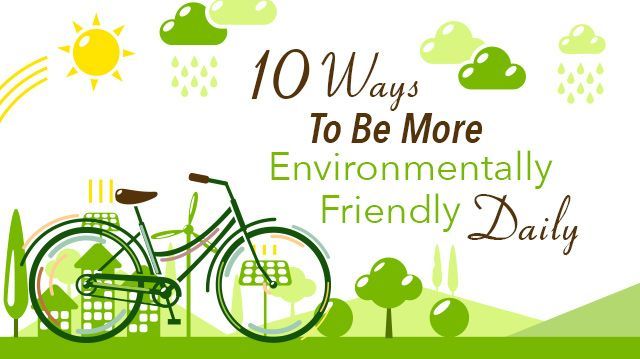
Many people think it takes grand actions on a large scale to help make a difference and help the environment, but really it’s the small, everyday steps that count. Developing small, simple eco-friendly habits can make all the difference in our fight to save the planet — and the great thing is they don’t require much of a change in your day-to-day routine.
Here are 10 steps you can take to become more environmentally friendly and help the planet every day.
Dim the lights
A lot of people don’t even think of lights when it comes to electricity consumption; however, household lighting can comprise as much as 10 percent of your electricity bill. Keep your energy use to a minimum by turning off lights when you don’t need them, installing energy-saving bulbs or getting up earlier and going to bed earlier to make the most of daylight.
Use any available space for plants
Plants absorb oxygen and pump out oxygen, therefore it stands to reason that planting as many green things as possible is a good step toward offsetting your carbon footprint. Besides, plants clear the air, regulate temperature, add moisture to dry apartments and homes in the winter months, and create a relaxing atmosphere. Get planting!
Ditch the bottled water
It takes more than 17 million gallons of oil each year to keep up with the demand for bottled water. Yes, it’s a good thing that you’re drinking water, but by drinking it out of plastic bottles you’re creating a market of wastefulness. Buy a good glass or stainless steel drinking bottle and you’ll not only be dramatically cutting down on waste, you’ll also be reducing your intake of nasty BPAs and other harmful chemicals found in plastic bottles.
Leave the car keys at home
Most of the time, we don’t actually need to drive our car in order to get where we need to go — it’s just a convenience thing. But leaving the car keys at home and taking the train or bus to work, or walking or biking down to the store instead of driving, can significantly reduce your carbon footprint and keep you fit as an added bonus.
Choose reusable cloth over paper
Paper towels and napkins are convenient for wiping up spills and they cut down on the chore of washing, but they create a lot of waste. Employ reusable cloths and napkins for cleaning up messes and wiping your face and you’ll not only reduce your waste generation, you’ll also save a few bucks on your grocery bill each week.
Stop printing things!
We live in an age where most things can be achieved online, and there’s usually very little need to print anything — yes, even at work, where your employer pays the ink and paper bills! Next time you’re about to print something, ask yourself whether you really need to do so or whether you can just save the document to your smartphone or tablet, or just email it instead.
Don’t spend so long in the shower
Let’s face it — you probably spend a lot longer in the shower each day than you need to, right? It’s understandable because showers are just so darn enjoyable. But they also use vast amounts of energy and waste a lot of water. If you’re serious about the environment, only shower for as long as you need to.
Think reusable
Yes, things like plastic bags, take-out containers and plastic cups are handy and they don’t leave a mess, but they’re also incredibly wasteful. Buy some sturdy reusable bags for your supermarket shopping (hint: they usually charge you money for plastic bags these days, so you’ll save in the long run!), some glass or metal containers for your lunch, snacks and leftovers, and enough glassware for drinks at work and at home.
Buy locally grown produce
One of the best ways to simultaneously reduce your carbon footprint and keep money in your community is to buy produce grown locally. Usually the best way to do this is to shop at a local green-grocer or only go to supermarket chains that source a lot of their food locally. You can take things one step further by also trying to spend your money only on locally made products where possible. Every little bit counts!
Cut out harmful chemicals
Not only are they harmful to you and your family, but hazardous chemicals such as paint, ammonia, oil and chlorine can pollute waterways, poison lakes and rivers, and release noxious gases into the air. Pouring something as simple as bleach down the sink still has the potential to end up in natural ecosystems and can severely degrade their health. Stick to biodegradable, low-VOC, environmentally friendly products.
It doesn’t take much to become an environmentally conscious person, just small steps every day. Keep it up, you’re making a difference!
—Liivi Hess
Liivi is an Integrative Nutrition Health Coach and is training to become a doula. She inspires women to find peace and personal power by taking control of health and fertility naturally. Liivi‘s passion is ancestral nutrition and primal lifestyle design. She and her partner Will live between Toronto, Canada and Queenstown, New Zealand.

